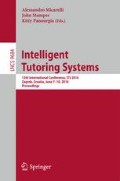Abstract
This study investigates how pedagogical conversational agents can facilitate learner-learner collaborative learning during a knowledge integration task. The study focuses on (1) how knowledge integration activity can be facilitated by using multiple Pedagogical Conversational Agents (PCAs) with gaze gestures and (2) how dyad coordination influences learners’ perspective-changing processes and understanding. In a controlled experiment, dyads were accompanied by multiple PCAs programmed to facilitate learning. Two eye-trackers were used to detect the learner’s learning process and coordination. The results show that learners who received facilitation from the PCAs about integrating different perspectives performed better on the task, and if they received gaze gestures, they tended to focus on the relationship of different knowledge as well. Recurrence analysis of gaze patterns show that those who performed well using PCAs synchronized their gaze.
Access this chapter
Tax calculation will be finalised at checkout
Purchases are for personal use only
References
Graesser, A., McNamara, D.: Self-regulated learning in learning environments with pedagogical agents that interact in natural language. Educ. Psychol. 45(4), 234–244 (2010)
Hayashi, Y.: On pedagogical effects of learner-support agents in collaborative interaction. In: Cerri, S.A., Clancey, W.J., Papadourakis, G., Panourgia, K. (eds.) ITS 2012. LNCS, vol. 7315, pp. 22–32. Springer, Heidelberg (2012)
Hayashi, Y.: Togetherness: multiple pedagogical conversational agents as companions in collaborative learning. In: Trausan-Matu, S., Boyer, K.E., Crosby, M., Panourgia, K. (eds.) ITS 2014. LNCS, vol. 8474, pp. 114–123. Springer, Heidelberg (2014)
Holmes, J.: Designing agents to support learning by explaining. Comput. Educ. 48(4), 523–547 (2007)
Kumar, R., Rose, C.: Architecture for building conversational architecture for building conversational agents that support collaborative learning. IEEE Trans. Learn. Technol. 4(1), 21–34 (2011)
Richardson, C.D., Dale, R., Kirkham, Z.N.: The art of conversation is coordination. Psychol. Sci. 18(5), 407–413 (2007)
Roschelle, J.: Learning by collaborating: convergent conceptual change. J. Learn. Sci. 2(3), 235–276 (1992)
Schneider, B., Pea, R.: Toward collaboration sensing. Int. J. Comput. Support. Collaborative Learn. 4(9), 5–17 (2014)
Schwartz, L.D.: The emergence of abstract representation in dyad problem solving. J. Learn. Sci. 4, 321–354 (1995)
Tomasello, M., Farrar, M.J.: Joint attention and early language. Child Dev. 57(6), 1454–1463 (1986)
Acknowledgments
This work was supported by 2012 KDDI Foundation Research Grant Program, Ritsumeikan University Program for Research of Young Scientists and the Grant-in-Aid for Scientific Research (KAKENHI), No. 25870910, 16K00219.
Author information
Authors and Affiliations
Corresponding author
Editor information
Editors and Affiliations
Rights and permissions
Copyright information
© 2016 Springer International Publishing Switzerland
About this paper
Cite this paper
Hayashi, Y. (2016). Coordinating Knowledge Integration with Pedagogical Agents. In: Micarelli, A., Stamper, J., Panourgia, K. (eds) Intelligent Tutoring Systems. ITS 2016. Lecture Notes in Computer Science(), vol 9684. Springer, Cham. https://doi.org/10.1007/978-3-319-39583-8_26
Download citation
DOI: https://doi.org/10.1007/978-3-319-39583-8_26
Published:
Publisher Name: Springer, Cham
Print ISBN: 978-3-319-39582-1
Online ISBN: 978-3-319-39583-8
eBook Packages: Computer ScienceComputer Science (R0)

